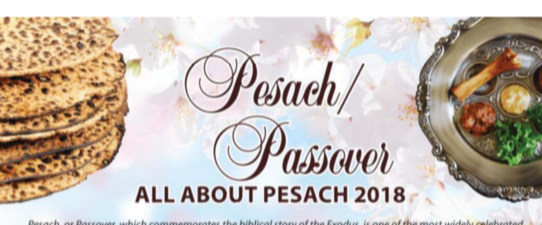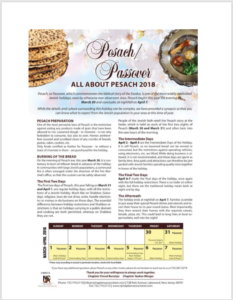(article courtesy of NJCA) Pesach, or Passover, which commemorates the biblical story of the Exodus, is one of the most widely celebrated Jewish holidays, even by otherwise non-observant Jews. Pesach begins this year the evening of March 30 and concludes at night on April 7.
- PESACH PREPARATION – One of the most pervasive laws of Pesach is the restriction against eating any products made of grain that have been allowed to rise. Leavened dough – or chometz – is not only forbidden to consume, but also to own. Homes are there for scoured and scrubbed clean of any crumbs of breads, pastas cakes, cookies, etc.
- BURNING OF THE BREAD – On the morning of Pesach eve, this year March 30, it is customary to burn all leftover bread in advance of the holiday. In communities with large Jewish populations, a communal fire is often arranged under the direction of the Fire Marshal’s office, so that this custom can be safely observed.
- THE FIRS TWO DAYS – The first two days of Pesach, this year falling on March 31 and April 1, are regular holiday days, with all the restrictions of a Jewish holiday. Much like on Shabbos (Saturday), religious Jews do not drive, write, handle electronics or money or do business on those days. The essential difference between holiday restrictions and Shabbos restrictions is that on holidays carrying in a public domain and cooking are both permitted, whereas on Shabbos they are not. People of the Jewish faith retell the Pesach story at the Seder, which is held on each of the first two nights of Pesach (March 30 and March 31) and often lasts into the wee hours of the morning.
- THE INTERMEDIATE DAYS – April 2 – April 5 are the intermediate Days of the Holiday. It is still Pesach, so no leavened bread can be owned or consumed, but the restrictions against operating vehicles, using electronics, etc. are lifted. While doing business is allowed, it is not recommended, and these days are spent as family time. Area parks and attractions can therefore be jam packed with Jewish families spending quality time together in honor of the holiday.
- THE FINAL TWO DAYS – April 6 – 7 marks the final days of the holiday, once again with the full holiday restrictions. There is no Seder on either night, but there are the traditional holiday meals both at night and by day.
- THE AFTERMATH – The holiday ends at nightfall on April 7. Families scramble to put away their special Pesach dishes and utensils and revert their house to its year-round status. Most importantly, they then restock their homes with the requisite cereals, breads, pizza, etc. This could lead to long lines at local supermarkets, well into the night!


